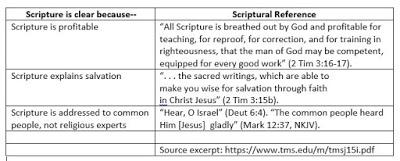I hope this fine fall week has offered you beautiful glimpses of God's creative intellect and His wonderful power. It's finally cooled down here in north Georgia. We always enjoy the march of the seasons. "He appointed the moon for seasons: the sun knoweth his going down." (Psalm 104:19, KJV). Wherever we are in the world, reading this blog, we see and understand the times and seasons. We look for the colorful leaves, the pumpkins, the migrating geese. The orderliness and consistency of the seasons since His ordination of them is a comfort. Yet even in Jeremiah 8:7 it is said of the seasons, meaning HIS season, "Yes, the stork in the heaven knows her appointed times; and the turtle and the crane and the swallow observe the time of their coming; but my people know not the judgment of the LORD."

I've always been interested in language, and how language, particularly through media, influences the mind. How it can clarify or obfuscate. The Emergent Church's penchant for insisting on 'respectful dialogue' was part of the tactic of obfuscation. It brought muddiness to the clarity of scripture and it is simply a defense mechanism for satan to deflect dogmatic truth. I posted a blog entry a long while ago titled "It's 2012 and homosexuality is still a sin" as a jab at emergent post-modern culture that says we have to get with the times and dialog about these points to see whether they are still relevant. I have an answer for you. They are still relevant. End of dialog.

Phil Johnson has said,
"Let's just agree to disagree." Well, no. How about we just argue until one of us actually refutes the other and we come to a common understanding of God's Word?
As a result of my interest in how language is used or misused, I've heard much of what John MacArthur has said or written on the subject. Here is his explanation of the tendency toward "tolerant dialogue" in his essay "The perspicuity of scripture"
"A new movement is now arising in evangelical circles. Apparently, the main object of attack will be the perspicuity of Scripture. Influenced by postmodern notions about language, meaning, subjectivity, and truth, many younger evangelicals are questioning whether the Word of God is clear enough to justify certainty or dogmatism on points of doctrine. Ironically, this new movement to a certain extent ignores all the previous debates. Instead, its proponents are more interested in dialog and conversation. As a result, they scorn and rebuff propositional truth (which tends to end dialog rather than cultivate it) as an outmoded vestige of twentieth-century modernism."
He's right. Proclamation of an incontrovertible truth tends to shut down conversation. It's supposed to, because there is no debating it. Strong's Concordance says the authoritative (binding) word of God, brings eternal accountability to all who hear it.
Do you really believe that scripture is so unclear about what's a sin? It isn't.
It is also just as clear on Jesus' love for us. People will accept that incontrovertible truth, while dismissing the truth of sin. God Sent His Son into the world to die for our sins. Jesus is the best person to ever live, die and live again. He is superlative, beautiful, and perfect. He saves us from our sins. Scripture is clear on that.
